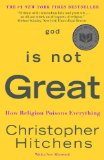Summary | Excerpt | Reading Guide | Reviews | Readalikes | Genres & Themes | Author Bio

Critics' Opinion:
Readers' Opinion:
First Published:
May 2007, 307 pages
Paperback:
Apr 2009, 272 pages
Most important of all, perhaps, we infidels do not need any machinery of reinforcement. We are those who Blaise Pascal took into account when he wrote to the one who says, “I am so made that I cannot believe.” In the village of Montaillou, during one of the great medieval persecutions, a woman was asked by the Inquisitors to tell them from whom she had acquired her heretical doubts about hell and resurrection. She must have known that she stood in terrible danger of a lingering death administered by the pious, but she responded that she took them from nobody and had evolved them all by herself. (Often, you hear the believers praise the simplicity of their flock, but not in the case of this unforced and conscientious sanity and lucidity, which has been stamped out and burned out in the cases of more humans than we shall ever be able to name.)
There is no need for us to gather every day, or every seven days, or on any high and auspicious day, to proclaim our rectitude or to grovel and wallow in our unworthiness. We atheists do not require any priests, or any hierarchy above them, to police our doctrine. Sacrifices and ceremonies are abhorrent to us, as are relics and the worship of any images or objects (even including objects in the form of one of man’s most useful innovations: the bound book). To us no spot on earth is or could be “holier” than another: to the ostentatious absurdity of the pilgrimage, or the plain horror of killing civilians in the name of some sacred wall or cave or shrine or rock, we can counterpose a leisurely or urgent walk from one side of the library or the gallery to another, or to lunch with an agreeable friend, in pursuit of truth or beauty. Some of these excursions to the bookshelf or the lunch or the gallery will obviously, if they are serious, bring us into contact with belief and believers, from the great devotional painters and composers to the works of Augustine, Aquinas, Maimonides, and Newman. These mighty scholars may have written many evil things or many foolish things, and been laughably ignorant of the germ theory of disease or the place of the terrestrial globe in the solar system, let alone the universe, and this is the plain reason why there are no more of them today, and why there will be no more of them tomorrow. Religion spoke its last intelligible or noble or inspiring words a long time ago: either that or it mutated into an admirable but nebulous humanism, as did, say, Dietrich Bonhoeffer, a brave Lutheran pastor hanged by the Nazis for his refusal to collude with them. We shall have no more prophets or sages from the ancient quarter, which is why the devotions of today are only the echoing repetitions of yesterday, sometimes ratcheted up to screaming point so as to ward off the terrible emptiness.
While some religious apology is magnificent in its limited way—one might cite Pascal—and some of it is dreary and absurd—here one cannot avoid naming C. S. Lewis—both styles have something in common, namely the appalling load of strain that they have to bear. How much effort it takes to affirm the incredible! The Aztecs had to tear open a human chest cavity every day just to make sure that the sun would rise. Monotheists are supposed to pester their deity more times than that, perhaps, lest he be deaf. How much vanity must be concealed—not too effectively at that—in order to pretend that one is the personal object of a divine plan? How much self-respect must be sacrificed in order that one may squirm continually in an awareness of one’s own sin? How many needless assumptions must be made, and how much contortion is required, to receive every new insight of science and manipulate it so as to “fit” with the revealed words of ancient man-made deities? How many saints and miracles and councils and conclaves are required in order first to be able to establish a dogma and then—after infinite pain and loss and absurdity and cruelty—to be forced to rescind one of those dogmas? God did not create man in his own image. Evidently, it was the other way about, which is the painless explanation for the profusion of gods and religions, and the fratricide both between and among faiths, that we see all about us and that has so retarded the development of civilization.
Copyright © 2007 by Christopher Hitchens





The Flower Sisters
by Michelle Collins Anderson
From the new Fannie Flagg of the Ozarks, a richly-woven story of family, forgiveness, and reinvention.

The House on Biscayne Bay
by Chanel Cleeton
As death stalks a gothic mansion in Miami, the lives of two women intertwine as the past and present collide.

The Funeral Cryer by Wenyan Lu
Debut novelist Wenyan Lu brings us this witty yet profound story about one woman's midlife reawakening in contemporary rural China.
Your guide toexceptional books
BookBrowse seeks out and recommends the best in contemporary fiction and nonfiction—books that not only engage and entertain but also deepen our understanding of ourselves and the world around us.